Afghanistan War, CIA Sponsored Terror, Civil Liberties, Criminalizing Dissent, FBI Intrusion, Guantanamo, Habeas Corpus, Human Rights, Political Prisoner, Prison Industry, Supreme Court, Surveillance, Targeting Muslims, Torture, War Resister
Podcast: Play in new window | Download
Updates:
—–
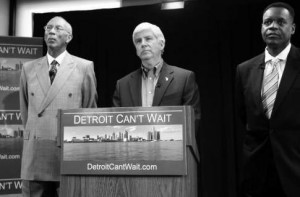
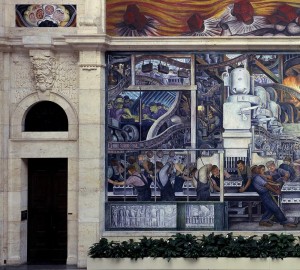
Judge Ruling Allows Detroit Bankruptcy To Move Forward
This summer we spoke with retired auto worker and activist Dianne Feeley about the plans to wipe out the pensions and health benefits of all current and retired city workers by emergency manager of Detroit, Kevyn Orr. We also looked at the history of workers in Detroit from the perspective of black workers and the broader pattern of oppression. Last week, a ruling by Judge Stevens W. Rhodes of the U.S. Bankruptcy Court allows the city of Detroit to move forward in the bankruptcy process. The cradle of the American auto industry will now be allowed to pay off debts and restore essential services.
Professor Laura Bartell:
- It is the first time that a bankruptcy judge that pension obligations constitute contractual obligations that are subject to diminution in bankruptcy.
- Although its rattled pensioners nationwide, its really not that extraordinary.
- The healthcare was never protected by the Michigan Constitution. Everyone has always known that healthcare was subject to modification by the city.
- The cuts in health care are going into effect I believe in February for city employees.
- When we’re talking about the pensions we’re talking about the retirees both the firefighters and policemen unions retirees.
- The city maintains that the plans are underfunded by 3.5 billion dollars.
- The union believes that number is vastly inflated based on projected returns that are too low. Whatever the number is its somewhere between 800 million and 3.5 billion.
- The policemen and firefighters don’t have the benefit of social security.
- You’re not talking about a lot of money going to any individual so if you cut the pension to any particular individual its obviously going to be a major cut for that individual.
- The major problem that Detroit has suffered was a vast decline in population.
- It used to be a much larger city. It’s footprint is still a very large city but the number of people living in that footprint is much smaller than it used to be.
- Among that small population there’s an even smaller number of people actually working and paying taxes.
- So the money coming in to meet the obligations of Detroit has been constantly shrinking.
- Detroit’s obligation to retirees in terms of pensions and healthcare is up at 38 percent and rising constantly. – and in addition we had severe mismanagement of city government including criminality. I’m sure everyone knows our former mayor is now in prison.
- My guess is the pensioners will be hit far less severely than the bond holders. Bond holders are making an investment and taking a risk.
- That’s what bankruptcy is about is all people who have done something to become creditors to the city and they’re not going to get what they deserve.
- That’s the problem, everybody is deserving, everybody should get paid.
- The problem is not that the governor has suddenly taken away the democratic rights of Detroit. We’ve had an emergency manager law for many years in the state of Michigan.
- Detroit is the latest and the biggest to have that happen.
- The next stage is a presentation of a plan of adjustment which he will present to creditors at the end of this month and file with the court at the beginning of January.
Guest – Professor Laura Bartell, after graduating from Harvard Law School, where she was an officer on the Harvard Law Review, she clerked for Judge Alvin B. Rubin of the U.S. Court of Appeals for the 5th Circuit in New Orleans. She then entered practice in New York where she became a partner in Shearman & Sterling, specializing in bank financing and bankruptcy work. She is a member of the American Law Institute and American Bankruptcy Institute and has published articles on bankruptcy topics, federal court-awarded attorneys’ fees and costs, and the attorney/client privilege and work-product doctrine. She teaches Property, Secured Transactions, Bankruptcy and Creditors’ Rights and Effective Oral Communication for Lawyers.
—–
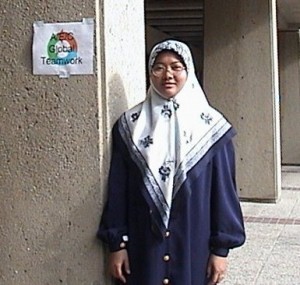

Terrorist Watch Lists and No Fly Lists Cases
How do governments compile lists called no-fly lists of individuals often placed on terrorist watch lists? As we’ve seen, the predictions about individual behavior of Muslims, Communists or Japanese-Americans have often been wildly inaccurate and cause a great deal of harm to these communities. Today to discuss the no-fly list and a recent case proceeding through the courts is returning guest Shane Kadidal senior managing attorney of the Guantánamo Global Justice Initiative at the Center for Constitutional Rights in New York City.
Attorney Shane Kadidal:
- There are broad watch lists and there are lists that people are more familiar with in concept and that’s what being litigated out in California, somebody placed on the no-fly list.
- There are two kinds of no-fly lists, there’s the selectee list where some where on the order of tens of thousands of people are designated for additional security checks when they go through the TSA.
- Then there’s the smaller list which contains several thousand names that sometimes you hear referred to as the no transport list. That’s people who can’t board a flight under any circumstances.
- The US shares its list at times with other countries. We don’t know how much sharing exists.
- The case in California is super interesting because the person who got stopped doesn’t seem like the kind of person that would get stopped except for the fact that she wears a hijab.
- The Terrorism Screening Center is responsible for putting people on the list.
- The interesting thing about this case is that daughter that was put on the list was 14, eight or nine years ago and is now a lawyer in Malaysia and was supposed to testify and was told by Malaysian airlines you are on the no-fly list.
- She’s seeking damages because she couldn’t fly back. This is really the first case to get to trial basically.
- The ACLU has a challenge to which kind of a pure due process challenge case in a case called Lateef v Holder.
- You got put on a list and there’s no real process for challenging those facts.
- If its an accidental match, somebody has the same name as you, or close to you. You can go through this challenge procedure called TRIPP.
- If you win your challenge, they’ll give you a number that you can enter in when you buy your plane ticket.
- CCR along with the Clear Clinic at CUNY Law School filed a case at the beginning of October. The gist of it is that people will end up on the no-fly list and if you complaint about it the FBI will say, if you talk to us you can be taken off the list if you agree to work as an informant on the Muslim community.
- What’s interesting about the couple thousand names (no-fly list) which is much smaller than the number which are on these lists intended to intercept terrorism finance like the list the treasury department maintains like a 500 plus page phone book.
- You can imagine that there might be some logical rationale behind having a short list of people who get a little scrutiny and hope it has more due process than the selectee list has now.
- But the fact that there are some people who are not allowed to fly under any circumstances with any level of search scrutiny that doesn’t seem to make any sense and seems to fit very neatly into our complaint.
- I question if this list can make rational sense.
- Typically if you’re on the no-fly list you get turned away. Typically you don’t get arrested.
- OFAC list, is sort of a list of parties you’re not allowed to do business with. It combines not only sanctions directed at whole countries but also the variety of sanctions directed at terrorism finance.
- This is just like other cases where secrecy is at the core of the defense of the program.
Guest – Shane Kadidal, senior managing attorney of the Guantánamo Global Justice Initiative at the Center for Constitutional Rights in New York City. He is a graduate of the Yale Law School and a former law clerk to Judge Kermit Lipez of the United States Court of Appeals for the First Circuit. In his eight years at the Center, he has worked on a number of significant cases in the wake of 9/11, including the Center’s challenges to the detention of prisoners at Guantánamo Bay (among them torture victim Mohammed al Qahtani and former CIA ghost detainee Majid Khan), which have twice reached the Supreme Court, and several cases arising out of the post-9/11 domestic immigration sweeps. He is also counsel in CCR’s legal challenges to the “material support” statute (decided by the Supreme Court last term), to the low rates of black firefighter hiring in New York City, and to the NSA’s warrantless surveillance program.
——————————————————————————
Afghanistan War, CIA Sponsored Terror, Civil Liberties, Criminalizing Dissent, Habeas Corpus, Human Rights, Political Prisoner, Prison Industry, Supreme Court, Surveillance, Truth to Power, War Resister
Podcast: Play in new window | Download
Updates:
- Jeremy Hammond Sentenced to 10 Years With 3 Additional Years of Supervised Probation
- Jeremy Hammond and Barrett Brown Were Outspoken In Exposing Corporate Collusion With The Government In Conducting Intelligence
- Sarah Kunstler Argument On Behalf Of Jeremy Hammond
—-
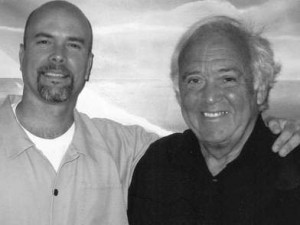
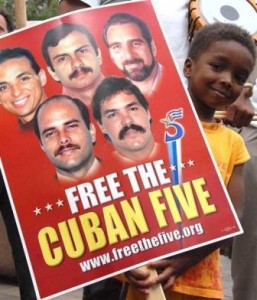
The Cuban Five Case Update: Attorney Martin Garbus
We’re joined today by prominent First Amendment attorney Martin Garbus to get an update on the Cuban Five case. Martin joined the case of the Cuban Five last year and had concentrated his efforts to expose how U.S. government paid journalists in Miami received hundreds of thousands of dollars from the office of Cuba broadcasting to slant the story against the Cuban Five. There’s a lot going on with the case lately such as a habeas corpus appeal, and a NSA / FISA related motion.
Attorney Martin Garbus:
- In 1996, 4 planes from Cuba shot down Brothers to the Rescue planes that’s a right wing group that operates in Miami and has over the years made intrusions to Cuban air space.
- After years of negotiations with the Cuban government and the American government where the American government said they would everything they could to stop these flights.
- Washington intended to do that but by the time it got down to Miami, the orders were ignored.
- So these planes went up in Feb 1996 and were shot down over Cuban air space.
- At the trial the jury concluded that the planes were shot down over international waters. They also concluded that the defendants in this case played some kind of role in the shoot down.
- Both administrations at the time (Bush / Clinton) wanted to be very hard on left wing Cubans or Cuba itself by pressing this prosecution.
- Although the shoot down was 1996, and the government had all the information it needed, it didn’t arrest these defendants until 2 and half years later.
- There was a conviction, at first the appellate court set aside the conviction. Lenny Weinglass argued that brilliantly in that a motion for change of venue should’ve been granted.
- Ultimately, that’s rejected, the Supreme Court denies cert, I get involved in the habaes corpus petition and that’s what we’re talking about now.
- We’re about to file other papers about NSA surveillance which has been revealed recently arising out of Snowden’s revelations.
- What I’m now telling you has not yet appeared anywhere else.
- The defense lawyers in the case, as they prepared the case itself, from the time they were appointed in 1998, to the time of the conviction, and now, Lenny Weinglass leading the defense, – these lawyers traveled back and forth to Cuba.
- We now understand and this applies to you, this applies to anyone who goes to Cuba.
- Anytime you go to Cuba, you’re picked up by NSA surveillance.
- The NSA listening post, the prime one was in Puerto Rico and it was made up largely of US Navy personnel, assigned to the Naval Security Group which is an NSA component.
- When I got back to the United States (from Cuba) they would continue to monitor me. If I were a defense lawyer, my communications with my client would gathered and sent to the FBI and Department of Justice.
- That’s the motion we’re about to file in the next 2 weeks.
- The Solicitor General, on October about 6 weeks ago, admitted there had been surveillance of cases where there had been convictions.
- Our case presents unique problems, Cuba at that time was designated a terrorist state.
- I’ve got the details in the way information was intercepted.
- A large part of the NSA budget last year I think was 52 billion dollars. 25 percent of it is for the CIA.
- What the CIA was doing under the umbrella of the NSA was exactly what the Church Committee said they couldn’t do.
- Journalists that worked for the Miami Herald or CBS, or local Spanish stations . . on the government payroll.
- The stations or newspapers that hired these journalists, didn’t know that they were also getting monies from the government. In 2006, the Miami Herald found out about it.
- One journalist got 286 thousand dollars.
- If you look at the Radio Marti stories, and you look at the Miami Herald stories, you have the same sentences, same paragraphs and its clear its coming out of a central cookie cutter.
- The Radio Marti budget was 15 million dollars a year.
Guest – Attorney Martin Garbus, one of the country’s leading trial lawyers. He has appeared before the United States Supreme Court and the highest state and federal courts in the nation. Time Magazine has named him “legendary . . . one of the best trial lawyers in the country.” He’s also known as the most prominent First Amendment lawyer.
—-
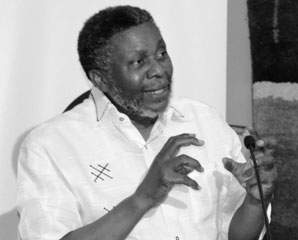
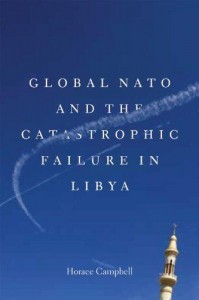
Global NATO and the Catastrophic Failure in Libya: Lessons for Africa in the Forging of African Unity
The course of events that led to NATO’s intervention in Libya is outlined in our guests Horace Campbell’s recently published book Global NATO and the Catastrophic Failure in Libya: Lessons for Africa in the Forging of African Unity. He traces the origin of the Libya conflict in the context of the Arab Spring uprisings and argues how NATO is used by the North American and European capitalist class to impose its political will on the rest of the world. It’s a new model, he explains, of bombing campaigns, militias, terrorist campaigns and private contractors. This NATO campaign caused many civilian deaths and destroyed Libya’s infrastructure. We talk about the broader attacks on the African continent and the investigations into the US embassy killings.
Professor Horace Campbell:
- The revolutionary upheavals that took place in Tunisia and Egypt have had great implication for all societies in this region.
- Libya which has been underdeveloped politically was a place where the western powers manipulated which was supposed to be an insipient uprising in Benghazi, militarized it and turned it into a base for the destabilization for all of North Africa.
- Today as we speak they continue to manipulate what is going on in the Libyan society.
- The book is called Global NATO because the governments of the North Atlantic region, namely the United States and its western European allies to internationalize the basis for military intervention by this NATO.
- NATO was created by this cold war instrument with a mandate to defend western Europe.
- NATO is in alliance with the most conservative countries in the Middle East called the Gulf Cooperation Council.
- We’ve had an attempt by the Wall Street elements to use NATO as an instrument for the United States military management of the international system.
- Why was NATO intervening? To control the resources of Libya, to destabilize North Africa, to stop the African Union project and to create confusion by supporting the same al-Qaeda elements that they’re supposed to be fighting in the “war on terror.”
- These are the reasons why the Left and the peace movement should have opposed the NATO intervention.
- Just like in Syria and Iran, there’s confusion among the Left and progressive forces about what’s going on.
- We need a resolution with responsibility to protect inside of Libya. To protect from the forces of NATO and to protect the Libyan people from the militias that have been unleashed by al-Qaeda, supported by the CIA and NATO.
- President Obama exercised intense pressure on the South African presidents and other presidents. I think he telephoned directly for them to vote for this resolution.
- The matter of Libya is not over.
- The same NATO that created the problem in Libya, the same United States, France and Britain is now seeking the support of Congress to go into Libya, into the same place that they created the problem.
- The U.S. designs on the continent of Africa is quite confused at the moment. It’s confused because of the assertiveness of the African Union and the African people.
- It turns out as we’ve seen in Libya, that it is the United States and the western forces that are supporting jihadists who are called terrorists. We’ve seen in a place like Somalia where the African people themselves through the African Union have been able to bring some stability to Somalia.
- There’s no military body that monitors the work of private military contractors.
- Now the peace movement should be calling for a reduction in the military budget.
- In the case of Libya, General Petraeus was using Benghazi as a base to recruit conservative Islamic fundamentalists from Libya to go to Syria to fight.
- Here’s a web of conspiracy of military, of Israel, Saudi Arabia and the CIA fomenting instability all across North Africa and the Middle East.
- There was no consulate in Benghazi, this was a CIA facility that was being used to support al-Qaeda elements.
- We have a situation in Libya where the country is in complete disarray. There’s no law, there’s no order. The people of Tripoli demonstrated two weeks ago against these militias and 40 people were killed.
Guest – Professor Horace Campbell is Professor of African American Studies and Political Science at Syracuse University. His recent book is Global NATO and the Catastrophic Failure in Libya. He is author of: Rasta and Resistance From Marcus Garvey to Walter Rodney; Reclaiming Zimbabwe: The Exhaustion of the Patriarchal Model of Liberation; Pan Africanism, Pan Africanists and African Liberation in the 21st Century; and Barack Obama and 21st Century Politics.
——————————————————————
CIA Sponsored Terror, Civil Liberties, Habeas Corpus, Human Rights, Political Prisoner, Prison Industry, Supreme Court, Surveillance, Targeting Muslims
Podcast: Play in new window | Download
Updates:
—-
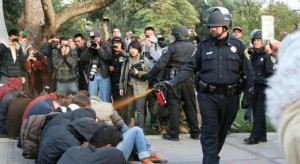

Lawyers You’ll Like: Attorney Brigitt Keller
On our Lawyers You’ll Like series we’re joined today by Attorney Brigitt Keller. She’s the Executive Director of the National Police Accountability Project (NPAP). Brigitt holds a law degree from Fribourg University Law School in her native Switzerland and an LLM in American Law from Boston University. She is admitted to practice law in New York. Prior to attending law school, Brigitt counseled victims of domestic violence and was instrumental in founding the Swiss National Council of Women’s Shelters. In addition to her engagement for NPAP, Brigitt is a fellow at the International Center for Conciliation and occasionally teaches conflict resolution workshops.
Attorney Brigitt Keller:
- NPAP’s mission is to hold law enforcement officers including prison personnel accountable for civil rights violations and police misconduct and brutality.
- As an organization we provide training and support for civil rights attorneys, legal workers and community activists.
- We also work with other organizations with similar efforts to change policy and practices and provide relevant information to the public.
- We see increasing disproportionate measures taken by police.
- The police (NYPD) no longer stop people when there is suspicious activity. They preventively sweep up hundreds of thousands of young men of color.
- When tasers were initially brought on the market, they were really sold to the public with the argument that they would be used instead of firearms.
- What we observe today and this counts for all over the country is that tasers are used in cases where there would never ever be a justification for the use of a firearm.
- When you think about why should we have police, its really to protect the people of this country,
- Young people of color have a very good sense of when policing is legitimate and when its not legitimate.
- These strategies make the community very unsafe. People will not call the police if the police behaves like an occupying army.
- I find the involvement of community activists and families of victims incredibly important.
- There is a different awareness today about police misconduct.
- I want to make clear that damage has been done already – that the fact that the judge was recused from the case with in my opinion, no valid reason. Secondly, the police are allowed to violate the rights of New Yorkers until the stay will be lifted.
- My interest in the law started initially by working for 7 years in a shelter for domestic violence victims.
- Police violence is something truly international. Even in a country like Switzerland where crime numbers are pretty low, there is police violence.
- I find it important that there is no abuse of power and police violence is abuse of power.
- www.nlg-npap.org
Guest – Attorney Brigett Keller – Executive Director of the National Police Accountability Project (NPAP). Brigitt holds a law degree from Fribourg University Law School in her native Switzerland and an LLM in American Law from Boston University. She is admitted to practice law in New York. Prior to attending law school, Brigitt counseled victims of domestic violence and was instrumental in founding the Swiss National Council of Women’s Shelters. In addition to her engagement for NPAP, Brigitt is a fellow at the International Center for Conciliation and occasionally teaches conflict resolution workshops.
—–

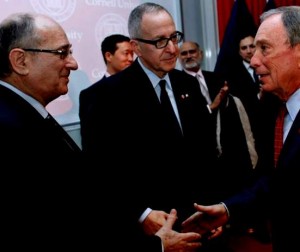
A Panel Discussion: Militarizing, Domestic Spying, and the Boycott of Israel
We hear a presentation by Anna Calcutt (New Yorkers Against the Cornell-Technion Partnership – NYACT), NYC-based BDS activist, will supply background on the conception and planning of the Cornell-Technion campus in NYC, along with reasons to oppose The Technion–including its deep-rooted ties with the Israeli weapons industry and military, the growth of the anti-Technion campaign, and what needs to be done next.
Recorded by Deep Dish TV
—————————————————————————————————-
CIA Sponsored Terror, Civil Liberties, Criminalizing Dissent, FBI Intrusion, Habeas Corpus, Human Rights, Political Prisoner, Prison Industry, Supreme Court, Surveillance, Truth to Power, War Resister
Podcast: Play in new window | Download
Updates:
- Wikileaks Film titled The Fifth Estate Is A Propaganda Piece Against the Disclosures of Wikileaks
- Wikileaks Film titled MediaStan Is Produced By Julian Assange
—-
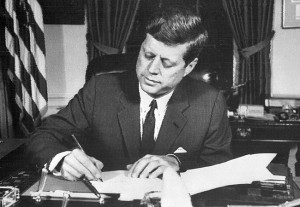
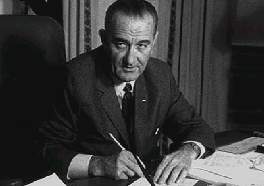
50th Anniversary of the Kennedy Assassination – Zachary Sklar, Screenwriter of the Film: JFK
November 22, 2013 will mark the 50th anniversary of the assassination of President John F. Kennedy. More than 600 books have been written on this national tragedy and yet the implausible explanations the Warren Commission report put forward remain as the official story. We’re joined today by Zachary Sklar to discuss some of those challenges and his work investigating those involved in the planning and covering up of assassinations.
Zach Sklar:
- The Warren Commission was a creature appointed by Lyndon Johnson.
- He persuaded Earl Warren to head this commission against his wishes. He was Chief Justice of the Supreme Court at the time.
- To bolster him on the commission, the one who did most of the work and guided the findings was Alan Dulles, former CIA directory. A man who’d been fired by John Kennedy after the Bay of Pigs invasion.
- The other one who was on it was Gerald Ford of course.
- So, there was a dissenting group of southern Congress people who really didn’t have much power. Ultimately, the power was with Alan Dulles.
- The CIA had overthrown Mossadegh in Iran, Arbenz in Guatemala, not only overthrowing governments but assassinating leaders.
- The commission report – that conclusion was decided upon and then they had to come up with some reasons to support it.
- The reasons were designed by Arlen Specter. He was a staff lawyer at the time and later a Senator from Pennsylvania. He came up with the Magic Bullet Theory.
- Because the Zapruder film came out with the time frame of 5.62 seconds and there were 3 bullets during that time frame, all the wounds in John Kennedy and John Connelly.
- Lee Oswald was given a paraffin test the day of his arrest. It was negative. It had proven he’d not fired a rifle that day.
- According to the Marines, Oswald was a mediocre marksman at best.
- The rifle that he was supposed to have used. . . if you ask any rifle dealer what the worst rifle, the least accurate rifle you could ever come up with they would tell you its the Mannlicher-Carcano. It’s called the humanitarian rifle by the Italians.
- All this should’ve been put to rest in 1979 when the House Select Committee on Assassinations investigated and came up with acoustical evidence from a police dictabelt recording and found that there was a 4th shot.
- If there was a 4th shot, there had to have been a second shooter. If there was a second shooter, there had to have been a conspiracy.
- Kennedy was well aware that the anti-Communist ideology of the cold warriors was fundamentally flawed. The whole domino theory is fundamentally flawed.
- After he was killed, very quickly, his (Kennedy’s) policies were reversed by Lyndon Johnson.
- The fact is that 4 days after he was killed Lyndon Johnson issued National Security Action Memorandum 273 which reversed Kennedy’s order and actually ok’s US military operations in Vietnam.
- On the very day he was assassinated Kennedy had sent a liaison to Cuba, to negotiate with Fidel Castro.
- At the top of the list are the leaders of the CIA.
- You have to understand that the Cold War had gone on for a long time, and people made careers, peoples’ livelihoods depended on the Cold War continuing. Big defense contracts depended on it.
- A lot of people had the motivation to kill Kennedy.
Guest – Zachary Sklar, Oscar-nominated co-screenwriter of Oliver Stone’s film JFK, and author of the book JFK: The Book of the Film. He’s a journalist, and a professor at the Columbia School of Journalism. He was also a contributor to The Lies of Our Times, a monthly journal dedicated to exposing the truth behind the mainstream media. Zach collaborated with director Oliver Stone on the screenplay of the movie “JFK” and was editor of Jim Garrison’s book “On the Trail of the Assassins.”
—–

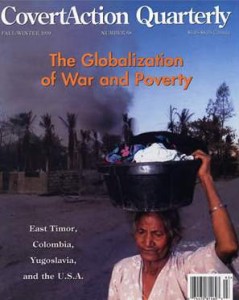
Lawyers You’ll Like: Attorney Bill Schapp
Attorney William Schaap graduated from the University of Chicago Law School in 1964 and has been a practicing lawyer since. Bill specialized in military law and practiced in Asia and Europe. He later became the editor in chief of the Military Law Reporter in Washington for a number of years. In the 70’s and 80’s he was a staff counsel of the Center for Constitutional Rights in New York City. In the late 80s, he was an adjunct professor at John J. College of Criminal Justice of the City University of New York where he taught courses on propaganda and disinformation.
Attorney William Schapp:
- One of first cases at this big Wall Street firm, they had some outside counsel working on it, one of whom was David Lubel, and Dave Lubel who had I think been a recruiter for the Communist Party in his youth, was always good at spotting somebody who was always worth recruiting and he started to tell me there was this convention of this lawyers group.
- It was this 1967 Lawyers Guild Convention in New York. He dragged me to one event, I met Bill Kunstler, I met Arthur Kinoy, I met Victor Rabbinowitz. I’d been on Wall Street for a year or two, I said I didn’t know there were lawyers like this.
- I joined the same day and met Bernadine Dorhn and a few weeks she called me and said we need your help.
- She said you gotta defend a bunch of Columbia students. The next thing I knew the riot started at Columbia and she said you have to go down there and defend them.
- I signed up to be staff counsel on the National Lawyers Guild Military Law Project in Okinawa, Japan.
- When you work overseas in that kind of a climate with the military you learn a lot fast about American imperialism.
- Once you learn that, you learn about the CIA.
- That led us to originally working on Counter Spy magazine and then on Covert Action Magazine.
- The original purpose was to expose the CIA. We worked with Lou Wolf who is an expert in uncovering CIA agents in US embassies, not through any classified documents but because if you knew how to read the paperwork and State Department things, you could tell who are the “ringers.”
- We were so successful that Congress passed a law against us.
- Our goal was to make these people ineffective because the only way most CIA could work, particularly the ones that were assigned to an embassy was to have to pretend to be something else.
- They were all third assistant political secretaries and those were all phony things. Their job was to finagle their way into various community organizations in whatever foreign capital they were posted to recruit people to turn against their own countries and become traitors to their own countries, to become spies for the U.S.
- We thought if we identified these people, it might make their job a little bit harder, which it did.
- Of course, the problem with that is the government said we were trying to get them killed which we weren’t trying to do and nobody we did expose ever did get killed.
- He (Philip Agee) had been an adviser to Counter Spy. Counter Spy folded when Welch got killed, cause the pressure was too much and started Covert Action Quarterly.
- He was not the person discovering who the under cover people were, Lou Wolf was doing that.
- Phil wrote articles for us in every issue and we worked very closely with him.
- Once you start exposing these things, they really don’t have any defense.
- They tried to catch us in something phony. We would get tips that would turn out to be CIA trying to get us to print some story that wasn’t true so they could then discredit us.
- We had more interference from the government when we were doing military law work, before Covert Action Quarterly.
- They would plant bugs in our attic in Okinawa, things like that.
- The Intelligence Identity Protection Act has 2 parts. One makes it a crime for someone in the government who has classified information to reveal someone’s identity. The second part makes it a crime to reveal the identity of someone you did not learn from classified information or you position. (But if you were in the business of exposing these people . . .)
- Regarding his newsletter The Lies of Our Times – It was in the 90s, from 1990 to 1995 I think. To a certain extent, the abuses we were crying about got a little bit less over time because that’s sometimes the helpful result of that kind of exposure.
- We were just tired of people thinking that if it was in the New York Times it must be true.
- The fact is that those people lie all the time.
- I think we’ve gotten to a point where people recognize that the government lies to them and that there’s an awful lot that goes on that they don’t know.
Guest – Attorney William Schapp graduated from the University of Chicago Law School in 1964 and has been a practicing lawyer since. Bill specialized in military law and practiced in Asia and Europe. He later became the editor in chief of the Military Law Reporter in Washington for a number of years. In the 70’s and 80’s he was a staff counsel of the Center for Constitutional Rights in New York City. In the late 80s, he was an adjunct professor at John J. College of Criminal Justice of the City University of New York where he taught courses on propaganda and disinformation.
In addition to being a practicing lawyer, Bill was a journalist, publisher and a writer specializing in intelligence as it relates to media. He was the co-publisher of a magazine called the Covert Action Quarterly for more than 20 years. He also published a magazine on propaganda and disinformation titled Lies Of Our Times. Attorney Bill Schapp has written numerous articles and edited many books on the topic of media and intelligence.
——————————————————————
CIA Sponsored Terror, Civil Liberties, Criminalizing Dissent, Habeas Corpus, Human Rights, Prison Industry, Surveillance, Torture, War Resister
Podcast: Play in new window | Download
Updates:
- Abu Anas al-Libi Kidapping Update
- Glenn Greenwald Leaves The Guardian
—–
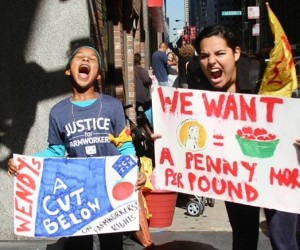

The Coalition of Immokalee Workers March On Union Square For Wendy’s Fair Food Campaign
We hear the voices of marchers involved in supporting the Coalition of Immokalee workers to urge Wendy’s to join its four fast food competitors in the award-winning social responsibility program that’s putting an end to decades of abuse in the fields. Burger King, Taco Bell, McDonald’s and others have come to the table to dialogue with farm workers to improve wages and working conditions in their supply chains. This demonstration was held on the eve of the CIW winning the Roosevelt Institute’s Freedom from Want Medal.
—-
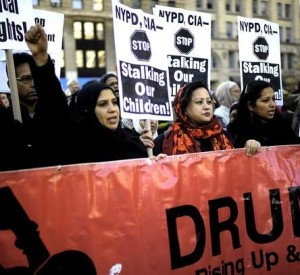
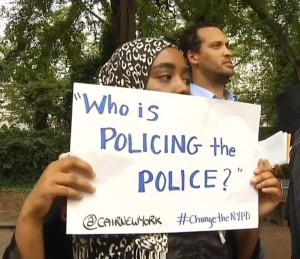
Handschu Hearing on NYPD Muslim Surveillance
Earlier this month, the federal district court in Manhattan required the New York City Police Department to defend its Muslim spying program. The hearing lasted several hours and revealed what many listeners to this show may already know, and that is how the NYPD Muslim spying program has been found by the Associated Press to target innocent Muslims based on nothing more than their faith. The fallout from these spying programs are revealed in the stories related by today’s guest .
Fahd Ahmed:
- DRUM stands for Desis Rising Up and Moving. It’s a community organization of low income South Asians, organizing for worker rights, immigrant rights, racial justice.
- We’re a membership based organization of about 2000 low income South Asians. So they’re directly effected by these issues.
- About 2 years ago the Associated Press started releasing a series of articles that essentially confirmed what people in our communities had been feeling for years.
- That the NYPD has an extensive spying network on the New York City Muslim community.
- From their houses of worship to their work sites, to their social networks. The way that they accomplish this is through the use of under cover officers.
- Through the use of informants, many of whom are paid money for their services, and also through the use of surveillance equipment.
- We have members in our organization that have been directly targeted by the NYPD over the last 8-9 years.
- Even if you’re not doing anything wrong, this program is very bad for you.
- On the day the first AP report came out, we had launched a survey project to collect data.
- An Arab cab driver who cooperated with the police, he was eye witness to the person who conducted the robbery.
- He testified in court, the person was convicted. The NYPD then approached him several months later and said we’d like to talk with you about that case.
- They tell him we want you to become an informant for us. When he declines, for the next two weeks he ends up being followed in dark unmarked cars.
- We do believe its about a few 100 hundred in the police department in terms of intelligence.
Guest – Fahd Ahmed, Fahd came to the United States as an undocumented immigrant from Pakistan in 1991, and went on to attend Vanderbilt University, and CUNY School of Law. Fahd joined DRUM in 2000 when he had family members facing deportations. Within DRUM, Fahd led the work with Muslim, Arab, and South Asian immigrant detainees before, and immediately after 9/11, by coordinating the detainee visitation program. Fahd was a recipient of the Haywood Burns Fellowship from the National Lawyers Guild, served as an Ella Baker intern at the Center for Constitutional Rights, as a legal consultant with the Juvenile Justice Project of Louisiana, and as a lecturer and researcher on Islamophobia, National Security, and social movements at the Arab and Muslim Ethnicities and Diasporas Initiative at the College of Ethnic Studies at San Francisco State University
—-
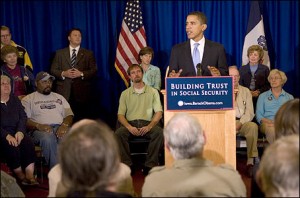

Two And A Half Party System Debt Ceiling Crisis
Today we’ll examine in depth how the United States reached the recent crisis with regard to debt ceiling. If you think its just the Tea Party that wants to cut current government benefits such as Social Security and Medicare you’d be wrong. It’s also the Obama Administration
Professor Jack Rasmus:
- The Republicans strategic focus since 2011 has been to cut the deficit at the expense of discretionary spending and in particular to target social security and medicare and medicaid.
- In the fiscal cliff deal of last year, they succeeded in pushing through most of the Bush tax cuts. 4 trillion in tax cuts.
- The Republicans in the last 2 years have cut 2.2 trillion dollars in government spending.
- They’re going to use the debt ceiling in order to extract more spending cuts, this time, social security and medicare, and probably more tax cuts.
- Obama has already called for 630 billion dollars in social security and medicare cuts. That’s a starting point, a beginning of negotiating.
- What’s happened is that the tea party have injected themselves into this thing. We’ve got 2 and a half parties in Congress now. The Tea Party is a faction of the Republican Party and its terrorizing the Republican Party even though its a minority in the House.
- The Tea Partiers are grandstanding for elections. This is all about mid-term elections next year.
- As far as the shutdown is concerned, that is a Tea Party problem.
- They have Republicans terrorized that they’re going to lose primaries.
- There’s another group within the Tea Party that are opportunists, they’re riding the crest.
- The people behind the Tea Party, out there in the grassroots, you know, the billionaires are funding it and the Heritage Action Groups. I think there are opportunists and confused ideologues.
- What you’re going to see is Obama blocking with corporate pressure on the leadership of the Republicans, and all 3 of them then giving the Tea Party a choice.
- Last year, unions lost 500 thousand members, even as a million and a half new jobs were created.
- Something real dangerous is going on with the labor movement.
- There is a nation wide formation called the Emergency Labor Network.
- Obama has been in favor of cutting Social Security for quite some time. He’s also been in favor of cutting the corporate tax rate from 35 to 28 percent. That doesn’t sound like the Democratic Party of years past.
Guest – Professor Jack Rasmus, Ph.D Political Economy, teaches economics and politics at St. Mary’s College in California. He is the author and producer of the various nonfiction and fictional workers, including the books ‘Obama’s Economy: Recovery for the Few‘, Pluto Press, 2012, ‘Epic Recession: Prelude to Global Depression‘, Pluto Press, 2010, and ‘The War at Home: The Corporate Offensive from Ronald Reagan to George W. Bush‘, Kyklosproductions, 2006
——————————————————
Afghanistan War, CIA Sponsored Terror, Civil Liberties, Criminalizing Dissent, FBI Intrusion, Habeas Corpus, Human Rights, Political Prisoner, Prison Industry, Surveillance, Targeting Muslims, Torture, War Resister
Podcast: Play in new window | Download
Updates:
- Lynne Stewart Turns 74
- Phone Campaign For Lynne Stewart To Be Let Out Of Prison Under Compassionate Release
- Director of Federal Bureau of Prisons – 202-307-3250
- U.S. Attorney General Eric Holder – 202-353-1555
- U.S. President Barack Obama – 202-456-1111
- Che Guevara Anniversary
- Shocking Statistics On Americans Under 30
—–
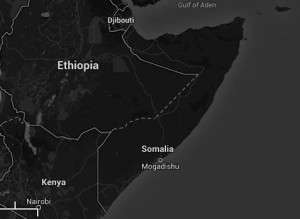
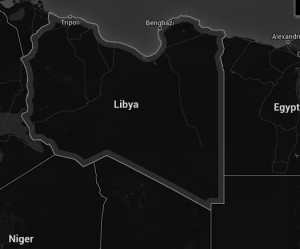
The United States Military Kidnapping In Libya And Failed Kill or?Capture In Somalia
The United States military had gone into 2 parts of Africa. In one case they went into Libya and brazenly seized a man who they claim to be a leader of Al-Qaeda, his name is Abu Anas al-Libi. He was seized out of Tripoli, Libya. The U.S. also went into Somalia and attacked a house or a compound in apparently an effort to grab or kill an alleged senior leader of the Somali group al-Shabab. Michael Ratner reports in this update.
Attorney Michael Ratner:
- It was shocking news to see that the United States think it can go into sovereign countries and kidnap, kill whoever they want. Did the US have the right to go into Libya at all?
- Article 24 of the UN Charter says that the territorial integrity of the a country is complete, except of the case of self-defense or authorized by the UN.
- There was no authority by the UN or international law to go into Libya.
- Then the question came up – Did Libya consent to it?
- He’s on some U.S. ship. It’s called the San Antonio.
- They’re keeping him floating on this ship while they’re going to interrogate him.
- Its true, Obama when he took office 5 years ago, he banned torture and he said all interrogations had to be done according to the Army Field Manual.
- Annex M allows 3 kinds of techniques that I think constitute cruel and inhuman, degrading treatment and taken together would constitute torture.
Law and Disorder Co-host Attorney Michael Ratner, President Emeritus of the Center for Constitutional Rights (CCR), a non-profit human rights litigation organization based in New York City and president of the European Center for Constitutional and Human Rights (ECCHR) based in Berlin. Ratner and CCR are currently the attorneys in the United States for publishers Julian Assange and Wikileaks. He was co-counsel in representing the Guantanamo Bay detainees in the United States Supreme Court, where, in June 2004, the court decided his clients have the right to test the legality of their detentions in court. Ratner is also a past president of the National Lawyers Guild and the author of numerous books and articles, including the books The Trial of Donald Rumsfeld: A Prosecution by Book, Against War with Iraq and Guantanamo: What the World Should Know, as well as a textbook on international human rights.
—-
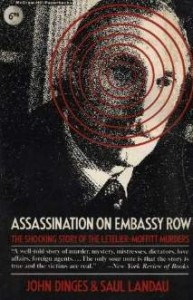

The United States, Iraq, Afghanistan, Iran, Syria and Israel Part 2
October 7th of 2013 marked the 12th anniversary since the United States invaded Afghanistan as the war drags into its 13th year. The Afghanistan war and the Iraq war have been estimated to cost tax payers up to 6 trillion dollars. This year marks the 10th anniversary of the Iraq War – an illegal war launched despite the global protest in the streets.
Phyllis Bennis:
- On the one hand it was a huge victory for the U.S. and the anti-war mobilization effort, that we managed to prevent what was a very imminent US strike. The British also had their missiles ready to go. They were very close.
- In combination with the British Parliament decision to say no, led to a huge shift in what the Obama Administration was prepared to do.
- It turns out they were prepared to go to war without UN permission. They were ready to do without the UN, without NATO, without the Arab League, but not without the Brits.
- This was a political decision, this wasn’t rooted in concerns about international law or any kind of strategic or military necessity.
- When it was turned over to Congress, a lot of organizations mobilized and said you know what, we’re not going to let this happen.
- Members of Congress were reporting that their emails were running 500 to 1, 800 to 1, 1000 to 1 against US military intervention.
- What we found is that people were not willing to sign on to another war after so many failed wars in the region.
- You can call it war fatigue but it’s really about learning a lesson, that war is not an answer to these problems.
- Given that there have been 100 thousand victims in this war (Syria) about a third of them civilians, about 43 percent regime soldiers and militia, about 18 percent rebel soldiers. The rest were civilians.
- To claim this was all about the humanitarian consequences, simply, that’s not the case.
- The voices that have been marginalized the most are the original political opposition in Syria, who were incredibly brave and courageous, still out there fighting.
- The regime in Syria was forced to sign on to the chemical weapons treaty. That’s huge, there are only 7 countries in the world that had not signed that treaty.
- Israel of course being another one.
- The number of people killed with chemical weapons in Syria is tiny compared to the number of people killed with conventional weapons.
- The five wars in Syria, the regional power struggle, the sectarian war, the US-Russian war, the US-Israel vs. Iran war, those are still underway in Syria.
- President Rouhani, the new president of Iran, was on a major charm offensive.
- Rouhani has said ” I have the backing of the Supreme Leader in a new approach to our nuclear negotiations.”
- There are enormous pressures in the U.S from the arms industry, from AIPAC, from hawks in Congress of all sorts.
- The Palestinians are the ones that will pay the price if there is an agreement between the US and Iran because the US will be determined to give Israel something.
- Iraq has become as violent as it was in the height of the sectarian wars of 2006 and 2007.
- Hundreds of people are being killed on a daily basis. It’s a disaster. Much of that is the result of the exploding war in Syria. Syria and Iraq share a long border. It’s a very porous border.
- The division of Libya into 2 or 3 regions is a very likely possibility.
- Saul Landau was a giant in our movement, he made one of the first films about Fidel. It was called Fidel it was made in 1960 a year after the revolution.
- He died about a month ago after a 2 year battle with a very virulent cancer.
- Saul had been at IPS almost at the beginning. He wrote the book Assassination on Embassy Row that documented with such precision on how Operation Condor had gone forward.
Guest – Phyllis Bennis, directs the New Internationalism Project at IPS. She is also a fellow of the Transnational Institute in Amsterdam. She has been a writer, analyst, and activist on Middle East and UN issues for many years. In 2001 she helped found and remains on the steering committee of the U.S. Campaign to End Israeli Occupation. She works closely with the United for Peace and Justice anti-war coalition, co-chairs the UN-based International Coordinating Network on Palestine, and since 2002 has played an active role in the growing global peace movement. She continues to serve as an adviser to several top UN officials on Middle East and UN democratization issues.
—————————————————————-

























